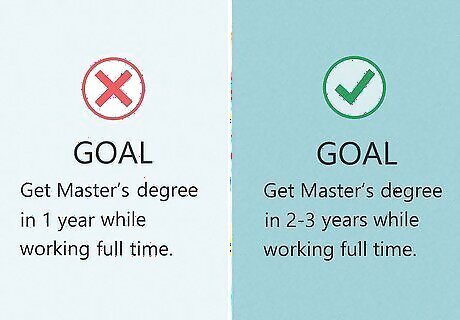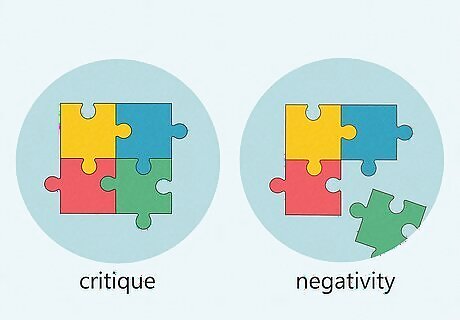
views
X
Expert Source
Sydney AxelrodCertified Life Coach
Expert Interview. 30 June 2020.
Setting a Path Towards Progress

Take responsibility for your actions. Your ability to make progress in life is often directly related to your willingness to take responsibility for your actions. Think about different aspects of your personal and professional life to figure out changes that could help you progress in life. For example, if bad grades or even a bad attitude are keeping you from getting into the college or job of your choice, accept your role and work on setting new goals for yourself.

Identify sources of insecurity. Being insecure can also hinder your progress. Figure out what may be causing you to feel less than confident, which can help you find a path to progress. List causes of insecurity or anxiety for you. Consider which elements you have the power to change in order to make tangible progress. For example, if you don’t have the same education as colleagues who are getting promotions, note that this may be causing a lack of confidence that affects your job performance. From here, you can either plan to further your education or distinguish yourself in some other way at work. Speak to a friend, colleague, or counselor about your lack of confidence and what is causing it. Discuss ways that you can boost your confidence. Offset your lack of confidence by focusing on something at which you excel or that gives you confidence. For example, if you don’t feel comfortable speaking in public, tell yourself that in spite of this, you write eloquent presentations.

Formulate tangible goals. Before you can start making changes that promote progress, you have to establish goals for yourself. By formulating specific aims for the short-, mid-, and long-term, you can easily remind yourself of what you’re working towards. Use the SMART method to develop your specific goals. SMART stands for: specific, measurable, attainable, realistic, and timely. For example, maybe you want to improve your half marathon time. Your goal would be: “I want to improve my current half-marathon time by ten minutes within the next six months. I’ll add two extra speed workouts per week and incorporate hills into one of my other runs.” Write your goals on paper. A visual cue can help reinforce your goals. For example, you could write the following: “My short-term goal is to take more initiative at work. My mid-term goal is to get a master’s degree and apply this to my job or another job. My long-term goal is to manage my own team at work.” Update your goals as necessary. Every few months, reevaluate them as a benchmark and to ensure they’re still attainable.

Keep expectations realistic. Maintaining attainable expectations throughout life can help you progress more easily. It may also impart more confidence to make positive changes. Check if your goals are realistic by speaking to another person or doing some research on whichever aspect of your life in which you’d like make progress. For example, if you are working full time and want to get a Master’s degree, it’s unlikely that you can finish in one year without quitting your job. However, exploring programs and seeing what is possible over the course of a few years may help you more easily get through a program. Keeping your company informed may also be to your benefit: it shows your willingness to make progress and improve your qualifications, which could lead to promotions or more responsibility in your job. Keeping your goals attainable can prevent anxiety that might hinder your progress. Consider talking to superiors, friends, or family members about your goals to help keep them in check.

Believe in your success. A person who is able to make progress often has two important traits: she has confidence in herself and believes in her ability to succeed. Cultivate and project confidence, which can help set you on the path for progress. Give yourself positive affirmations every day. For example, you can say “I’m going to get all of my work done and enjoy class so that I can finish my MBA.” Surround yourself with people who believe in your success and actively support you making progress. Confidence comes from difference places, such as knowing you have proper education and training or from maintaining good personal and professional relationships. Understand that both disappointment and failure are important parts of making progress. For example, even someone as successful as Steve Jobs experienced failures on his path to success.
Affecting Positive Changes

Recognize that you are unique. Everyone has different strengths and weaknesses. Recognizing that you are unique and able to excel at many things can boost your confidence and help you start making changes. Focus on yourself and develop your abilities, which can minimize the temptation to compare yourself to others. Remind yourself that there is no one else like you and that you offer a combination of experiences that no one else has.

Focus on your strengths. List your strengths and focus on highlighting them in whatever situation you like. This can help counteract any negative thoughts that may arise and in turn build your confidence and promote progress. Make a list of your specific strengths to remind yourself that you have a lot to offer. Remember that your strengths can be actual and emotional ones, from the ability to make sales to providing excellent support for friends and colleagues. For example, you might note, “I am able to think up great ideas for marketing campaigns that help our team. I need to work on effectively expressing those ideas on paper, but working with Emma can help me to develop these skills. We work well together and make a great team.”

Confront your challenges. Just as focusing on your strengths is important, so is developing your skill set. Our strengths are often things we find easy to do and accomplish. Things we don't find as easy are often an indication that we need to work on an aspect of ourselves. Often, these feel like they are weaknesses. Because these things may be hindering you, working on improving your skills may help you more effectively make progress in any part of your life you wish. Take any opportunity to further your education and training. This can help in any area of life in which you want to make progress. Whether it’s for your job or a hobby, such as mountain climbing, expanding your current horizons may help you more quickly progress. For example, if you need to develop your writing or public speaking skills, take a course at a local college or online. This can help you develop your skills and provide support and much needed positive feedback.

Have passion for any endeavor. You need to love what you do in order to make progress in life. Having or developing passion for aspects of your personal and professional life can help you be successful and make progress. You are less likely to take any initiative that might otherwise help you progress if you don’t love what you do. Learning to balance the positive and negative can help you more quickly make progress. For example, maybe you hate writing weekly reports but enjoy the research. You could break up this work by writing sections throughout the week and balance it out with research in between writing.

Take calculated risks. Making changes that allow you to progress may require taking some risk. Taking a calculated risk can help you more quickly make progress and reap the benefits than if you choose to stay in one place. Remember the phrase “Look, think, leap” when considering taking a risk. This process can prevent you from making an impulsive decision that could hurt you. Figure out the risk level of any opportunity and weigh it against the status quo. Know how much you can and are willing to lose, and operate within this range. Write detailed plans and contingency plans for any risk.

Support your goals. Surrounding yourself with supportive people can help build your confidence. These individuals can help steer you towards progress and counteract any negativity you may be experiencing. Ask a superior at work, family member, or friend to mentor you. They can help you move past failures, build your confidence, and reinforce your goals. Working with a counselor or therapist can also be a useful way to help you get past elements that may hinder your progress. Make notes whenever you talk to your support group about your goals. Having a list of points, such as strengths and weaknesses or how to improve, helps focus the conversation.

Keep moving forward. Most progress often comes with setbacks along the way. Keep yourself moving towards your goals and you can much more easily make the progress you want. For example, if you apply for a new job and don’t get it, look for other positions and continue to do good work in your current position. Likewise, if you don’t meet a running goal, increase or improve your training to help you meet the goal at your next race. There is significant evidence that having a positive attitude can promote progress in your life. Staying the course can bring you confidence and success.
Maintaining a Positive Attitude

Reframe negativity. Holding on to negativity can undermine your ability to make progress. Reframing it into something positive can help you begin making positive changes that promote progress. If you find yourself listening to the little voice in the back of your head, a voice that criticizes and puts forth negative thoughts and feelings, try responding to that voice by reframing. Instead of thinking, "This project is too big and is beyond my abilities. I'm never going to finish on time," reframe the same situation as a positive challenge: "If I break it down into smaller pieces and move forward, one step at a time, I can handle this project. I just need to focus and really step it up." Learn from negative feedback. Talking to family, friends, and superiors can help you constructively process negative feedback and then implement suggestions on how to make progress. For example, perhaps your boss asks you to redo a project on which you spent a lot of time. Instead of getting mad or wallowing in sorrow, schedule a meeting with your boss and speak to her about what you did wrong and how you can improve your performance.

Differentiate between "critique" and "negativity." There is a significant difference between someone who offers constructive criticism and a person who is a negative influence in your life. Understanding the difference between a critique and negativity can help you more effectively limit negative influences that may be hindering your progress. Critique is meant to help you in some way. Use it to make progress in your life. For example, your professor might say, “You need to do a better job of proofreading.” This is a suggestion to help you improve and you can take this an apply it for future success. Negativity is often an attitude of pervasive pessimism or unhappiness, which studies have shown can bring you and your ability to be positive down. For example, you may have a friend or colleague who never believes anything will work out or constantly complains about life. Limiting your exposure to this kind of negativity can help you stay positive and make progress.

Embrace positivity. Your attitude — from thoughts to actions — can have a significant impact on your outlook. Embracing positivity about yourself and others can help build your confidence and promote progress in your life. Seek the positive in any situation. This can shift your mindset and help you more effectively progress in life. Maintaining a positive attitude will contribute significantly to building your confidence, which in turn can promote progress and success. Consciously use positive language. For example, repeat positive affirmations every morning when you wake up. Say to yourself, “Because I try my hardest I am able to tackle anything the day brings.” Caring for yourself can significantly improve your ability to make positive changes. Exercising, eating healthily, and getting regular and sufficient rest all help reduce stress, which can hinder progress.

Work on decreasing perfectionism. Perfectionism is an extreme tendency to strive for perfection. It's also the tendency to find flaws in everything one does. These are often not realistic or productive standards. The bar set for perfection is way too high, and is often not seen by others as a standard. The same goes for these perceived flaws; the flaws are often overly critical, and are often not seen as flaws by other people. Pursuing such unconstructive thoughts and behaviors hampers the progress one can make in life. Always try your best, but don’t let the noble ideal of perfectionism keep you from trying or finishing things. For example, if you have been practicing yoga for only a year, you may not be able to perform a perfect handstand just yet. However, continuing to practice (even imperfectly) can help you to improve. Expectations of perfection can seriously and negatively affect your personal and professional relationships.

Allow yourself to rest. Give yourself the opportunity for sufficient rest throughout the day and in general. Rest can refresh you, help you avoid burning out, and can reset you towards progress. Take short breaks during the day, which allow your brain and body to relax and refresh. Schedule annual vacations and mini-breaks to promote rest and invigoration, which in turn can reduce stress and promote progress. A ten-minute walk or jog can help your body and mind to decompress, while an annual vacation where you completely unplug from your life will reinforce your daily efforts to reduce stress.




















Comments
0 comment